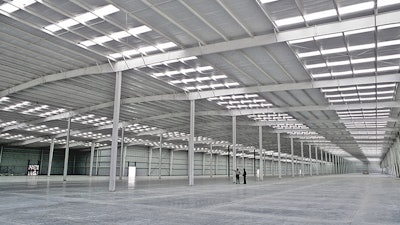
2016 was a landmark year for cannabis, setting up 2017 as a year of rapid expansion for the industry. Many established companies hit the ground running and new groups are joining the industry and building new cutting-edge cultivation facilities.
Here’s a quick look at five companies and facilities to watch in 2017.
1. G Farma, Desert Hot Springs, Calif.
G FarmaBrands announced an expansion into Desert Hot Springs in the summer of 2016, and construction is underway for its Innovation Center, which will consist of a 100,000-square foot cannabis growing and processing compound, according to a report from KMIR, the NBC affiliate in Palm Springs, Calif.
The project is broken down into three sections, according to a plan proposed by G Farma. The first section is a G FarmaPark Innovation Center, a 30,000-square foot manufacturing facility and a 10,000-square foot greenhouse. The two other sections are separate greenhouses that the company is leasing to willing growers. Those spaces combine for over 54,000 square feet of footprint. The project is expected to be done by this autumn.
Per its website, the company’s Innovation Center will bring “together all of the company’s R&D talent, including two specialists who have been formulating for G FarmaBrands since its inception,” and will be “responsible for everything from recipes and varieties to packaging and launch efforts.”
2. Del-Gro, Coachella, Calif.
The city of Coachella held a ceremony breaking ground on the first commercial cannabis facility Feb. 9. With all its available spaces being rented out, Del-Gro will be open for business on the property that was formerly Ajax Auto Wrecking.
"Opening the first cultivation operation in Coachella is an incredible opportunity for us and our partner cultivators", said Ben Levine, founder and CEO of Del-Gro. "We forecast that our operation will ultimately bring in over $100 million in annual revenue for us and the independent growers we work with. But greater than that, we're thrilled that the residents of Coachella have trusted us to be industry trailblazers in their city."
City Officials, business leaders, community stakeholders, and friends were invited out for the ground-breaking ceremony. Del-Gro's operation could generate over $3 million in taxes annually for the city of Coachella.
3. Aurora Sky, Edmonton, Alb., Canada
Aurora Cannabis, a Canadian licensed medical marijuana producer (LP) based in Vancouver, British Columbia, announced in December 2016 the start of a new super cannabis facility to be located in Alberta at the Edmonton International Airport: Aurora Sky.
According to the company’s press release, the facility will span a whopping 800,000 square feet and will allow the company to enjoy “access to abundant and reliable low-cost power, as well as unparalleled proximity to infrastructure and essential services, such as gas, water, sewage, public transportation, courier services, and international customs for clearing supplies and equipment. Furthermore, the location facilitates capitalizing on opportunities for future export of product and genetics to legally authorized jurisdictions around the world.”
Read more about Aurora Cannabis and its new facility in the March issue of Cannabis Business Times.
4. Saints Cloud, Portland, Ore.
In CBT’s January cover story on Panacea Valley Gardens, owner Jesce Horton said he was working on a cannabis cultivation and culture hub located between downtown Portland, Ore. and the Portland airport. That project has officially broken ground.
The project is called Saints Cloud (it was named Saints Cannabis, originally) and is a three-stage building process. Stage 1 is expected to be completed by the end of the year, and will consist of nine bloom rooms spread over 20,000 square feet of cultivation space, a dispensary, and an on-site processing facility to make edibles and extracts. Three of those bloom rooms, as well as the dispensary, will be open for business by the end of the summer, according to Horton.
The facility will feature water recycling, solar paneling and a heat exchange system to reduce the facility’s energy and carbon footprint. “The heat exchange will take excess heat from the cultivation space and re-circulate it to the offices, dispensary and kitchen,” Horton says.
Horton is also considering additional uses of solar energy outside of the energy panels, and is in the middle of feasibility testing for different options.
Stage 2 will be in construction early in 2018 and consist of an additional 12,000 square feet of greenhouse space, while Stage 3 will see the addition of an event space for concerts and parties, a lounge so patrons can consume their purchased cannabis on-site, and a boutique Bed & Breakfast, which Horton believes will boost tourism to the area.
“Portland culture is making waves across the world, and we want to capture that,” Horton says. “We’re really excited about what we can bring to the community: local, national and international. We’re providing a model for the cannabis industry for years to come.”
5. Americann, Freetown, Mass.
Another late 2016 announcement came from Colorado-based Americann, which announced Dec. 28 that it was going to build the largest cannabis cultivation facility in America in Freetown, Mass. The size: one million square feet.
Tim Keogh, CEO of Americann, said in an interview with Boston Business Journal that he aims to make the Massachusetts Medical Cannabis Center “the place in the northeast U.S. for the creation of a wide variety of exciting new advanced products for medical cannabis patients.”
According to Quartz, construction of the project is set to begin this March on a 53-acre tract of land and will include energy-efficient greenhouses for cultivation, plant processing spaces, facilities for creating infused products, a testing laboratory, research and training centers, and corporate offices. Space will be sold or leased to businesses registered under the Massachusetts Medical Marijuana Program, and AmeriCann has a Host Community Agreement from Freetown that will enable businesses in the park to get streamlined preferential licensing.
AmeriCann said in a statement that it “will set a new cannabis industry standard for energy efficiency, cost control, clean cultivation practices, and the production of Nutraceutical-grade infused products for the patients of Massachusetts.”
Photo at top: © Arturo Osorno | Dreamstime.com
























